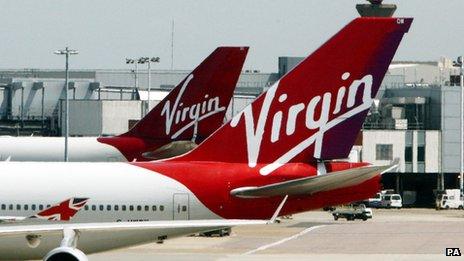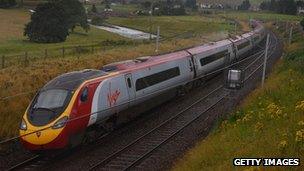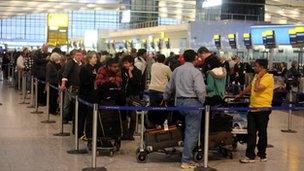Signal failures and holding patterns
- Published

Virgin has been teasing passengers with the possibility of flights from Scotland
It's hard to know if Britain's having a serious debate about transport, or merely going through a slow-motion political train wreck.
Coalition politics was never this fractious at Holyrood while it was trialled over eight years. Nor is this the norm in continental Europe.
But the splits run deep, and not only between the coalition parties, but within the Conservative Party, where discipline and the party's traditional loyalty to the leadership has taken a break, at least for summer.
So perhaps the call for a third runway at Heathrow is only a ploy to get at the leadership - as Tim Yeo put it, is the PM "a man or a mouse"? It's a proxy for testing whether David Cameron and his cabinet can be forced into yet another U-turn.
Tory heartlands
Likewise, the campaign against the decision to take the West Coast rail franchise from Virgin Rail and give it to FirstGroup, for a very large and arguably unrealistic fee, seems only to have gathered steam because the Government has already shown itself to buckle easily under pressure.
Will Brian Donohoe, the Ayrshire MP who chairs the cross-party aviation group at Westminster have as much impact with his criticism of Air Passenger Duty? Perhaps not, but it too looks ripe to become a cause for air travellers and the travel industry to see if they can shoot down another government policy.
Away from Westminster and the Conservative Party, it's hard to gauge how serious this is politically. If there's rebellion in Scottish Tory ranks, it's quite muted, suggesting this is one for the heartlands.
Yet transport is serious stuff for the economy, and for Scotland, the links into London are particularly so.
Virgin loyalty
It's not so clear that Scotland takes a particularly strong view on the West Coast line. First Group runs ScotRail, and makes a reasonable fist of it.
There are gripes and complaints, but it's hardly insurrection. And perhaps because this is an Aberdeen-based company, there's not quite the same visceral mistrust that seems to rage in parts of England.
On the other side, you have to marvel at Sir Richard Branson's PR genius. Who else could persuade more than 150,000 people that they adore his brand enough to sign a petition to keep Virgin Rail running the West Coast line?
It's almost as if he was running the service out of goodwill rather than for profit.
You'd think Virgin itself had spent the many billions it took to bring the West Coast line up to safety and reliability standards.
But you'd be wrong: although Virgin Rail sought to pioneer a new type of rail company on the line, it was the taxpayer, through Railtrack and Network Rail, that made the biggest investment and difference to the service.
Political long-haul
On Heathrow, the business lobbies have been warning for some time, but without much resonance, that it's in Scotland's interests to unblock the capacity bottleneck.

The Scottish government would like to see high-speed rail on the West Coast
From London, it's not seen as an issue for the rest of Britain. When this is not about internal Tory or coalition politics, this is being portrayed as an argument within the metropolis about noise pollution and constituency interests where majorities are marginal.
It's also about the economic dynamo of the south-east. Those who want to be seen supporting the economy are portraying Heathrow as a proxy for growth.
They see an increase in capacity as releasing potential for more activity and output, while they see a refusal to do so as a means of handing advantage to other major hub airports to take over Heathrow's international dominance.
It's not just that Paris, Amsterdam and Frankfurt offer fewer capacity constraints. It's also that well-located airports led by Dubai and Istanbul are growing very fast. With longer-haul aircraft now available, there's no a need for a European stopover for links between Asia, Africa and North America.
Inbound and sunbound
Amid the big global picture, it's easily forgotten that Scotland and Heathrow could both use competitively-priced short-haul feeder flights.
As I've said before, it's not nearly as important that Scots find their way through Heathrow to get on holiday - that's easily done by other routes.
Easyjet is making it easier still, depending on where it flies the two new aircraft coming to Edinburgh Airport (announced today) that will add to the five already there.
What's striking about this is that it's in talks with VisitScotland, Scottish Enterprise the Edinburgh Marketing bureau about destinations. Previously, airlines have tended to emphasise the options for Scots to head for the sun. But if it's talking to public sector organisations, the intention is to bring foreign travellers into Scotland.
An incentive for doing so, through the Air Route Development Fund, was previously barred by the European Commission for breaking state aid rules, but the attempts continue to find a way to avoid that blockage.
However many direct routes are added, Heathrow remains very important for the Scottish economy because inbound high-end business and tourist travellers want easy and reasonably priced ways of transferring onto internal flights so they can do business and enjoy the tourist offer north of the Border.
The same is true of Northern Ireland.
Monopoly money
It's also important Scots in business can get to markets. And that often requires them to get through Heathrow if they are to have the hub's flexibility. Luton just doesn't cut it.

Heathrow is one of the busiest airports on Earth
The standard open return fare between Glasgow and Heathrow has just gone from £486 to £526. If you want face-time with a business client, that makes for an expensive cup of coffee.
Of course, there are cheaper fares, but the experts I've asked say that capacity is constrained, particularly on the Glasgow route where British Airways has a monopoly, and prices have been rising as a result.
BA's owner, IAG, also has a monopoly on Heathrow links with Aberdeen and Edinburgh, since taking over BMI. But it will have to give up several slots to another airline as a condition for the takeover.
Virgin Atlantic announced it's going to use those slots and run the services from next spring. Checking out the detail, that may be a bit premature, as they haven't yet secured the slots for sure.
Flying over the Pole
And amid the political noise from Government MPs, it's strange how low-key the Scottish government has been about this.
Asked what the position is, a spokeswoman for Transport Scotland responded that it's a matter for Westminster: "The Scottish government's priority is to encourage routes to and from Heathrow that will support business opportunities and encourage inbound tourism for Scotland and to see high speed rail from Scotland to London as soon as possible".
That's clear enough. But it's odd how quietly it's being stated. That may be because there's a clash with the Scottish government's green credentials, as there would be if Whitehall reversed its position on a third runway.
And there's a useful reminder from the commentator George Monbiot of the much bigger picture - that the week that saw British politics begin a slanging match about Heathrow's third runway as a virility (or rodent) test of the Prime Minister, scientists told us that the Arctic ice is melting faster this year than it has since they started measuring it.
Respond to this article, or follow breaking Scottish businessheadlines: @BBCDouglsFraser